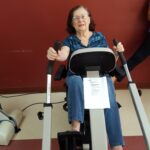Dementia is an umbrella term connoting memory and cognitive impairment
Alzheimer’s Disease is the best known of the Dementias and affects around 5 million Americans. Other causes or forms of dementia include: Parkinson Dementia, Lewy Body, Vascular, Frontal lobe, and Traumatic brain injury to name a few.
Depending on the type of dementia or the area of the brain affected will result in the impairment of short term or long term memory, sequential thinking, physical coordination, judgement, the executive functions of the brain which command critical thinking, planning, problem solving and so forth. With Alzheimer’s disease, the progression goes from one area of the brain to another over the course of many years (15-20 or so). Each area affected results in the loss of some type of function. In the last stages of AD, physical manifestations occur: eating, movement and bowel/kidney control are affected.
A person with dementia requires special consideration. Alzheimer’s disease is a form of brain damage and it is degenerative. However, for the first several years, folks can remain functional in many ways or require some assistance with personal care. They will at some point stop driving and need assistance with household tasks, bookkeeping and social involvement.
Technology can help with some things such as wandering, medication reminders and contact with family. Day Care is a wonderful way for a person with dementia to receive cognitive stimulation, be with others who are more or less on their level and hold at their current level of functioning for a longer time. Medications help in the early and mid-stages. Your neurologist will advise the combinations of medications which will be most beneficial to you or your loved one.
Family caregivers in the U.S. are in the millions and provide most of the day-to-day care for their loved one. PATIENCE is one of the most important virtues a caregiver can have or obtain. If you are a caregiver, you may consider individual therapy to work through your feelings about being a caregiver and watching your loved one decline over time. You may also gain some patience, too. Remember, it is the disease, and not the person, which is causing all of the intense feelings and change in how you view your present and future. It is time to enlist friends, family, or religious organizations to help you. Hiring a caregiver even a few hours a week can be helpful and beneficial to both you and the person you are caring for. This is one of the reasons Paradise Home Health Care has only a 2 hour limit. You need a break to recharge! It will also make you a better caregiver once you accept help or hire help. No one can manage everything for long periods of time and not pay a huge cost. Primary family caregivers are at greater risk in some ways than the person you are caring for. (Six out of ten primary caregivers pass away before the person they take care of).
Here are two excellent videos explaining Alzheimer’s and Dementia from Nova Southeastern University
Effective Communication Strategies in Dementia Care
Helpful Hints for Caregivers Dealing with Dementia/Alzheimer’s Disease:
- Get help for yourself as needed. Don’t be a hero.
- Consider Day Care, if it isn’t right for you at present, try it every 6 months. Day Care is a wonderful thing.
- Resist arguing or reasoning, they don’t have the mental capacity to understand logic and reasoning.
- Remember, you are the decision maker, not the person with cognitive impairment. They may get a vote but not the final say.
- Speak in a kind even tone. Tones are understood more than words.
- Smile often and look into their eyes. This is calming and better understood than talking.
- Give a choice, either or, not asking open-ended questions. “Do you want eggs or cereal instead of what do you want for breakfast?”
- Lay out clothes for your partner or parent rather than telling them to get dressed, say “put on your under clothes, your shirt, your pants”.
- Remember, their thinking ability is compromised. Break down tasks into each step for as long as they have the capacity to follow simple directions.
- Don’t let PERFECT be the enemy of the GOOD. Oft times, “good enough” is good enough.
- Consider going to a Caregiver Support group for information and to hear from others who are living to some degree, your life.
- Use plates with color rather than white so that food shows up better on them.
- This is a family situation, your children need to learn about the diagnosis, behaviors and when you need support too.
- True, no one can care for your loved one like you can, but they can do a lot. Besides, you cannot care for your loved one if you are in the hospital or rehab center.
- Prioritize what is truly important and work on letting go of the things that are not.
- Allow your loved one to participate and help out as they can. We all need to feel valued and purposeful on some level.
- Use the Alzheimer’s Association 24-hour Hotline. 1.800.272.3900
Know that some relationships will change. People may mean well but not know what to do or say. When help is offered, either to sit with your spouse or parent or pick up groceries, the answer is yes, thank you.
Paradise Home Health Care will introduce caregivers who are experienced and certified in Alzheimer’s care. They will know how to redirect your loved one to avoid or minimize irritation. They will know how to speak with and care for someone with dementia and to keep to a routine. Coaxing, cajoling and even therapeutic fibbing are ways to help care for a person who has dementia. Respect and dignity go hand in hand with Dementia Care.




